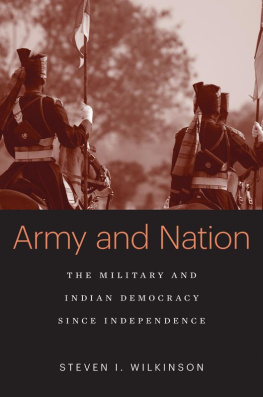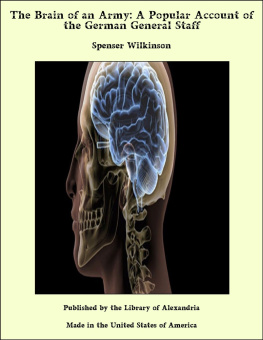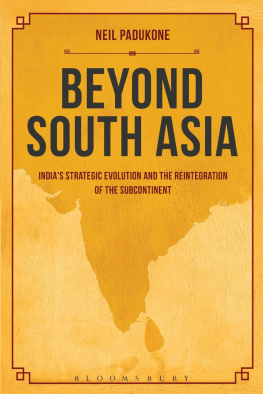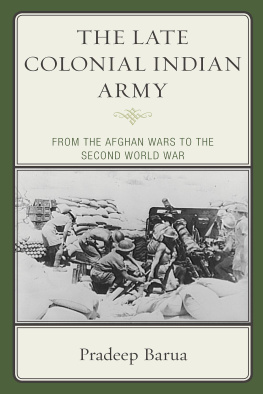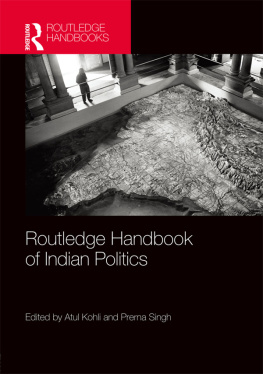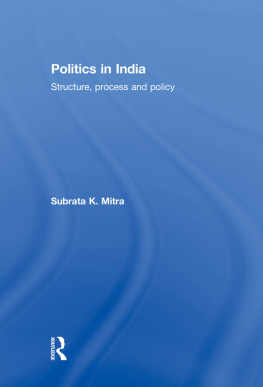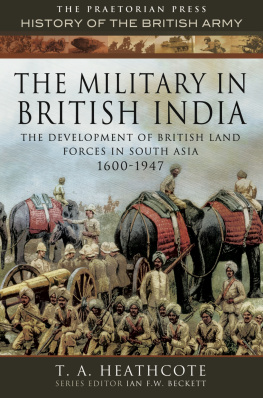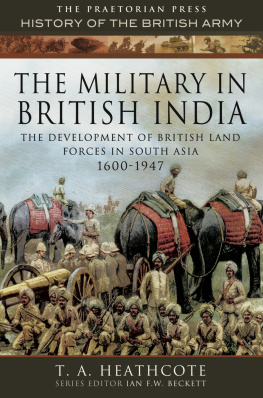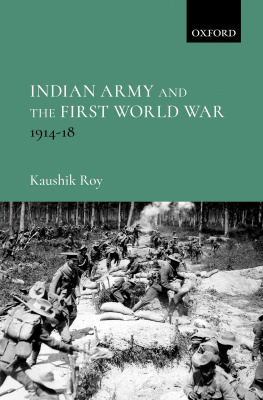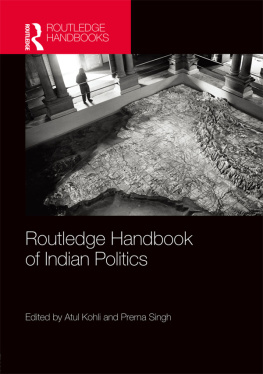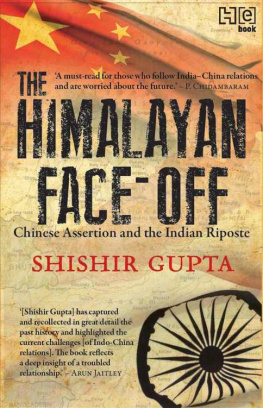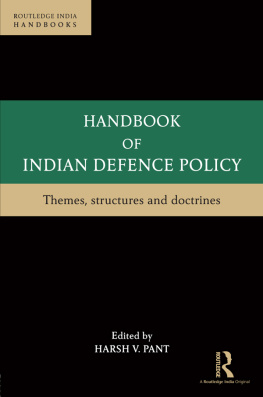Army and Nation

THE MILITARY AND INDIAN DEMOCRACY

SINCE INDEPENDENCE

STEVEN I. WILKINSON

Cambridge, Massachusetts
London, England
2015
Copyright 2015 by Steven I. Wilkinson
All rights reserved
Cover art: Courtesy Thinkstock
Cover design: Tim Jones
The Library of Congress has cataloged the printed edition as follows:
Wilkinson, Steven I., 1965
Army and nation : the military and Indian democracy since independence / Steven I. Wilkinson.
pages cm
Includes bibliographical references and index.
ISBN 978-0-674-72880-6 (hardcover : alk. paper)
1. India. ArmyHistory. 2. Civil-military relationsIndiaHistory. 3. IndiaPolitics and government1947. 4. IndiaMilitary policyHistory. I. Title.
UA840.W55 2014
322'.50954dc23 2014016505
To Donald L. Horowitz
Contents
ON SEPTEMBER 12, 1946, shortly after taking office as minister for external affairs in Indias pre-independence cabinet, Jawaharlal Nehru sent a long letter to the Commander in Chief and Defence Secretary to press for large-scale reforms to the Indian Army. To the colonial officials who read Nehrus letter this seemed a dangerous and even reckless proposal, given the bloody and almost uncontrollable communal riots in Calcutta the month before, during which six thousand people were slaughtered. The last thing India needed, from their perspective, was to destroy the one force standing between the country and mass disorder. But Nehru argued, on the contrary, that reform of the military was absolutely necessary to safeguard Indias new democracy. The most urgent thing to do, he said, was to transform the whole background of the Indian Army, which meant changing the composition of the martial class regiments, drawn heavily from the Punjab and a handful of other provinces, so that they reflected the broader Indian nation and its aspirations.
In pressing for these changes, Nehru was reflecting more than three decades of nationalist opposition to Indias divide and rule
In country after country, such ethnically imbalanced armies proved fatal to democracy soon after independence. New democracies were overthrown as minority-controlled militaries sought to preserve their power against new democratic majorities, and as ethnic majorities used force to try to displace minority groups from power (Enloe 1980; Gutteridge 1962, 1969; Harkness 2013; Horowitz 1980, 1985). Where the ethnic imbalance between a groups representation in the army and its representation in the population, government, or the economy was very high, the chances of violence and civil war increased sharply (Horowitz 1985, 458). Where, as in postcolonial states such as Australia, Canada, Botswana, and Malawi, the imbalance between the population and army was low the chances for stable democracy increased (Chandra and Wilkinson 2008). One recent statistical study of all African states after independence, for instance, finds that there were much higher numbers of coup attempts in those countries where there was a mismatch between the proportion of the ethnic group in the army and that in control of politics. This was especially true where there was no external guarantor of security, such as a French or British military base that could allow foreign powers to step in and protect the local regime (Harkness 2013).
The Question
This book asks why India, which inherited a deeply imbalanced colonial army, a mercenary army as nationalists sometimes derisively called it before independence, has been able to largely solve the problem of army and nation posed by Nehru in September 1946. Like its neighbor Pakistan, and like many other states in Africa and Asia, India inherited an ethnically unrepresentative, cohesive, and politically conservative military that was seen by nationalists as a major threat to democracy. New data I have collected for this book (see ) show that immediately after independence in 1947 around three quarters of Indias officers and men were from a small number of provinces and martial classes, with only 10 percent of Indias overall population. Half of all Indias most senior officers came from one single province, Punjab, with only 5 percent of the new states population.
This kind of narrowly recruited and cohesive army is dangerous, according to scholars such as Morris Janowitz, because armies with high internal cohesion will have greater capacity to intervene in domestic politics (1977, 144; see also Horowitz 1985, 532559; Janowitz 1964). After independence, in country after country, narrowly based and cohesive armies overthrew democratically elected governments drawn from a much wider swathe of the population, which seemed to threaten their power, in a pattern that was repeated from Sierra Leone to Syria (Horowitz 1985, 472496, 527528). In some former colonial states, such as in Francophone West Africa and South East Asia (Singapore and Bhutan), leaders tried to overcome such domestic imbalances by relying on the continued presence of troops from the former colonial power, at least until the local military could be rebalanced (Bedlington 1980). But Indias new leaders were clear from the beginning that they did not want to rely on an external power for security. Yet despite these challenges India has succeeded in keeping the army out of politics and preserving its democracy, unlike its neighbor Pakistan, which has had three long periods of direct military rule and a lot of indirect army control and interference besides. This book seeks to explore the reasons why? How and why has India successfully managed its military when Pakistan has failed, despite similar institutional inheritances at independence in 1947?
Explanations for the Divergence
The answer to this question might initially seem obvious. First, experts on Indian defense often point out that India inherited a professional British-style military in which politics was kept out of the mess, generals were kept out of politics and the public eye, and the lines of civil-military authority were clear. In his reply to Nehrus September 1946 letter, for instance, the Commander in Chief, Field Marshal Sir Claude Auchinleck, reassured him that The Armed Forces of India understand very well, I think, that they exist solely to carry out the policy of the Government which is in power, and that officers, whether British or Indian, and men must not allow their political views, if they have any, to influence them in any way in the execution of their duty. This fact has been impressed continuously on all ranks of the Navy, Army and Air Force.
Such professional traditions are important. But they are also clearly not able on their own to explain the democratic divergence that we observe between India and Pakistan. For one thing, the most senior Indian officers and Pakistani officers had all trained at Sandhurst and served together before 1947, and one internal army analysis of their political views in 1946 identified little difference between them (S. K. Sinha 1992, 7980). So why did this common professional experience lead ex-Indian Army officers to participate in a coup in Pakistan in 1958, but not in India? More generally, why did similar British professional military training and professionalization not prevent coups in Nigeria, Sierra Leone, and many other former British colonies?

